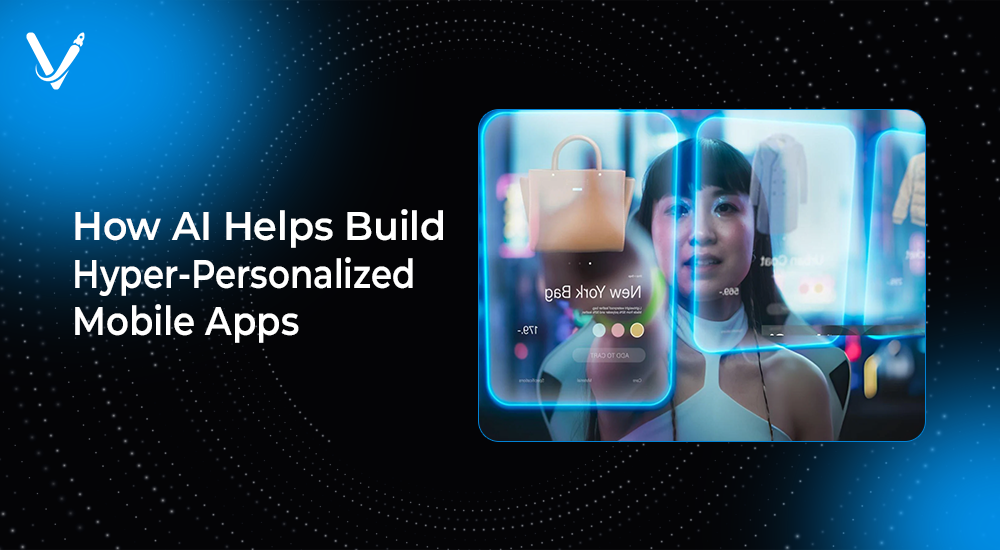How AI Helps Build Hyper-Personalized Mobile Apps


- Sep 6, 2025



In today’s digital era, personalization has become the heartbeat of mobile experiences. Users no longer settle for generic interactions; they expect applications to understand their needs, preferences, and behaviors. This growing demand for hyper-personalization has placed artificial intelligence at the center of app development strategies. Artificial intelligence not only helps businesses analyze user behavior at scale but also enables them to craft mobile apps that deliver experiences unique to every individual. The integration of AI transforms mobile applications into smart companions that anticipate user desires, recommend the right content, and adapt in real time. This blog explores how AI empowers hyper-personalization in mobile app development, why it matters, the technologies involved, and how businesses can leverage it to thrive in a highly competitive digital marketplace.
Personalization in mobile applications has evolved significantly. Earlier, apps could only offer simple modifications such as greeting users by name or saving basic preferences. As digital ecosystems became crowded and users grew more demanding, developers realized that surface-level personalization was no longer enough. Hyper-personalization emerged as the solution, offering experiences shaped by advanced data analysis and machine learning models.
Hyper-personalization uses real-time data, behavioral analytics, and predictive algorithms to tailor the app journey at every touchpoint. Instead of presenting the same content to every user, hyper-personalized apps adapt dynamically, ensuring that each interaction feels relevant and engaging. This shift has been fueled by artificial intelligence, which processes vast datasets far beyond human capacity and uncovers actionable insights that developers can transform into personalized experiences.
User expectations in the mobile-first world have skyrocketed. With millions of apps competing for attention, delivering generic features is no longer sufficient to retain customers. Hyper-personalization matters because it establishes stronger user connections, keeps audiences engaged, and builds brand loyalty.
Businesses leveraging AI-driven personalization enjoy higher conversion rates, better user satisfaction, and improved retention. Imagine a fitness app that not only tracks your workouts but also recommends routines aligned with your progress, health goals, and lifestyle habits. Or a music app that adapts its playlists based on your mood and time of day. Such experiences create an emotional bond between users and the app, increasing the chances of long-term adoption.
Moreover, hyper-personalization directly impacts business revenue. Studies consistently show that personalized recommendations lead to higher purchase frequency and larger average order values. In short, AI-driven personalization is no longer a luxury—it is a necessity for businesses that wish to remain competitive.
Artificial intelligence introduces a range of capabilities that redefine personalization. By analyzing behavioral patterns, contextual data, and real-time interactions, AI creates experiences that resonate with individual users. The following areas highlight how AI drives this transformation.
AI excels at predicting future behavior based on historical data. Mobile apps can leverage predictive analytics to anticipate what a user is likely to do next. For example, an e-commerce app can suggest products based on browsing history and seasonal preferences. Similarly, a news app can curate articles that align with past reading habits. Predictive analytics ensures that users are constantly presented with content or features that feel relevant and timely.
Recommendation engines have become synonymous with AI-powered personalization. Platforms like Netflix and Spotify have demonstrated the power of algorithms in curating personalized content. For mobile apps across industries, recommendation systems can suggest videos, courses, products, or services that align with the user’s unique interests. These engines learn over time, becoming increasingly accurate in anticipating user needs.
Natural language processing (NLP) enables apps to understand and interact with users in human-like ways. Chatbots and voice assistants powered by NLP can provide personalized responses, making interactions smoother and more engaging. An AI-powered travel app, for instance, can process a user’s text or voice query such as “find me a beach resort with family-friendly amenities” and deliver tailored suggestions within seconds.
AI enables advanced segmentation by analyzing how users interact with the app. Instead of creating broad user groups, behavioral segmentation dives deep into micro-segments based on real-time actions. For instance, a mobile game can identify casual players, competitive players, and social players, offering each group customized challenges and rewards. This granularity ensures that every user feels valued and understood.
Modern AI models incorporate contextual information such as location, time, device type, and even environmental conditions. Imagine a food delivery app recommending hot beverages on a rainy evening or a ride-hailing app suggesting faster routes during rush hour. By combining behavioral insights with contextual awareness, AI delivers personalization that feels natural and intuitive.
AI-powered personalization is not limited to one sector—it spans across industries, shaping user experiences everywhere.
E-commerce platforms thrive on AI-driven personalization. Product recommendations, dynamic pricing, and tailored promotions ensure that shoppers discover items aligned with their preferences. AI also powers personalized notifications, reminding users about abandoned carts or alerting them to relevant sales. This targeted approach significantly increases conversion rates.
Healthcare apps leverage AI personalization to enhance patient care. By analyzing medical history, lifestyle data, and wearable device inputs, AI-powered apps can recommend personalized wellness plans, track symptoms, and even provide medication reminders. Hyper-personalization ensures patients receive care tailored to their unique health journey.
Streaming platforms lead the way in demonstrating how AI drives hyper-personalization. Content recommendation engines keep users engaged for longer periods by suggesting movies, shows, or songs that align with their tastes. Beyond recommendations, AI also adapts app interfaces, prioritizing content categories based on user behavior.
EdTech platforms are rapidly adopting AI for personalized learning experiences. AI assesses learning patterns, identifies strengths and weaknesses, and delivers content suited to individual progress. Personalized quizzes, study plans, and real-time feedback keep learners motivated while ensuring better outcomes.
FinTech applications use AI to provide hyper-personalized financial insights. By analyzing spending habits, income levels, and goals, AI can recommend budgeting strategies, investment opportunities, and credit options. This level of personalization builds trust and empowers users to make informed financial decisions.
Data is the foundation of hyper-personalization. Without accurate and extensive datasets, AI cannot deliver meaningful insights. Mobile apps collect data across multiple touchpoints—user profiles, browsing history, purchase records, device sensors, and external APIs.
AI models process this data to identify trends and deliver actionable recommendations. For example, analyzing clickstream data in an e-commerce app reveals which products attract attention but rarely convert. This insight helps optimize recommendations, enhancing user satisfaction and business revenue.
However, the role of data extends beyond collection and analysis. Ensuring data quality, relevance, and security is critical. Inaccurate or outdated data can lead to irrelevant recommendations, frustrating users instead of delighting them. Similarly, businesses must handle user data responsibly, maintaining transparency and adhering to privacy regulations such as GDPR and CCPA.
The impact of hyper-personalization is profound, benefiting both users and businesses.
For users, hyper-personalized apps offer convenience, relevance, and engagement. They no longer need to sift through irrelevant content or struggle with generic interfaces. Instead, every interaction feels tailored, increasing satisfaction and loyalty.
For businesses, hyper-personalization drives measurable outcomes such as higher retention rates, increased conversions, and stronger customer lifetime value. Personalized push notifications, for example, achieve far higher engagement compared to generic messages. Moreover, businesses gain a competitive advantage by positioning themselves as customer-centric innovators.
While the benefits are undeniable, implementing AI-powered personalization comes with challenges.
Data privacy remains a major concern. Users are increasingly aware of how their data is collected and used. Developers must balance personalization with privacy, ensuring transparency and compliance.
Another challenge lies in the complexity of AI models. Building and training advanced algorithms requires expertise and resources. Small businesses may struggle to implement sophisticated AI without external support.
Additionally, personalization must avoid crossing into intrusiveness. Overly aggressive recommendations or excessive notifications can overwhelm users, leading to app abandonment. Striking the right balance between helpful and intrusive is key to successful personalization.
The future holds immense potential as AI technologies continue to advance. Emerging areas such as federated learning, edge AI, and emotion recognition will elevate personalization further.
Federated learning allows AI models to train on user data without transferring it to centralized servers, enhancing privacy while maintaining personalization. Edge AI processes data directly on devices, enabling faster and more secure personalization in real time. Emotion recognition promises apps that can detect mood and adapt accordingly, offering experiences that feel deeply human.
As these innovations mature, hyper-personalized mobile apps will become the norm, blurring the line between digital interactions and real-life experiences.
Artificial intelligence has redefined what is possible in mobile app personalization. By analyzing vast amounts of data and learning continuously, AI enables developers to create hyper-personalized applications that adapt to every user’s unique needs. The benefits range from improved engagement and loyalty to tangible business growth.
As technology evolves, businesses that embrace AI-driven personalization will stand out in competitive markets. At Vasundhara Infotech, we specialize in building AI-powered solutions that transform ordinary apps into intelligent platforms. If you are ready to deliver next-generation experiences, let’s collaborate to create mobile applications that truly resonate with your audience.
Copyright © 2025 Vasundhara Infotech. All Rights Reserved.